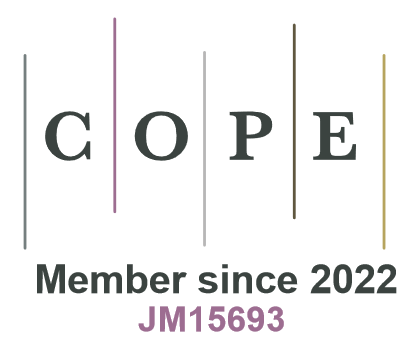Reliability of retrospective assessment of the age of first menstruation
DOI:
https://doi.org/10.18778/1898-6773.86.4.06Keywords:
menarche, prospective method, retrospective method, continuous researchAbstract
The age of the first menstruation is one of the indicators for assessing the course of puberty. It is also a sensitive indicator of the economic situation of individual professional groups or societies, and the low average age of menarche is widely recognized as a marker of society’s well-being. The aim of the study was to analyse the reliability of the retrospective method of assessing the age at menarche by comparing the results to the age obtained from continuous research. Data regarding the age at menarche came from longitudinal somatic development and physical fitness studies conducted between 1976 and 2022. In 2022, 47 women were examined. In continuous studies, the prospective method was used in the assessment of the age of first menstruation while in the 2004 and 2022 studies a retrospective method was applied. Only in 4 out of 47 women the age of the first menstruation declared in 2004 and 2022 (the women were 32–34 and 50–52 years old, respectively) was consistent with the one found in continuous studies. In other cases, there was a discrepancy between the age found in continuous studies and self-reported in 2004 or 2022 or between the age stated in 2004 and 2022. Of those women who were present for the 2022 study, 36 had information about the age of first menstruation from continuous studies and the age of menarche in 2004 was given. For this sample the arithmetic mean and the standard deviation of the age at menarche were calculated. It was found that the retrospective method often used in the assessment of the age of the first menstruation is not fully reliable, as the average discrepancy in the assessment ranged from nearly 1 month (0.05 years) to over 2 months (0.19 years) compared to the prospective method. Women surveyed in 2004 determined the age of the first menstruation more accurately compared to statements obtained 18 years later from the same women. This study suggests that long-term memory (LTM) of a significant life event of every woman is unreliable, as indicated by the difference in the declared age of the first menstruation of women examined in 2004 and 2022, which, in individual cases, was up to 3, 4 or 5 years.
Downloads
References
Barkai H-S, Nichols JF, Rauh MJ, Barrack MT, Lawson MJ, Levy SS. 2007. Influence of sports participation and menarche on bone mineral density of female high school athletes. J Sci Med Sport 10(3):170–9. https://doi.org/10.1016/j.jsams.2006.05.018
View in Google Scholar
DOI: https://doi.org/10.1016/j.jsams.2006.05.018
Bergsten-Bruceford A. 1976. A note on the accuracy of recalled age at menarche. Ann Hum Biol 3:71–3. https://doi.org/10.1080/03014467600001151
View in Google Scholar
DOI: https://doi.org/10.1080/03014467600001151
Brix N, Ernst A, Lauridsen LLB, Parner E, Støvring H, Olsen J, Henriksen TB, Ramlau- Hansen CH. 2019. Timing of puberty in boys and girls: A population-based study. Paediatr Perinat Epidemiol 33(1):70–78. https://doi.org/10.1111/ppe.12507
View in Google Scholar
DOI: https://doi.org/10.1111/ppe.12507
Casey VA, Dwyer JT, Coleman KA, Krall EA, Gardner J, Valadian I. 1991. Accuracy of recall by middle-aged participants in a longitudinal study of their body size and indexes of maturation earlier in life. Ann Hum Biol 18:155–66. https://doi.org/10.1080/03014469100001492
View in Google Scholar
DOI: https://doi.org/10.1080/03014469100001492
Chowdhury S, Shahabuddin AK, Seal AJ, Talukder KK, Hassan Q, Begum RA, Rahman Q, Tomkins A, Costello A, Talukder MQ. 2000. Nutritional status and age at menarche in a rural area of Bangladesh. Ann Hum Biol 27(3):249–56. https://doi.org/10.1080/030144600282136
View in Google Scholar
DOI: https://doi.org/10.1080/030144600282136
Cichocka B, Żarów R. 2002. Secular changes of age at menarche in girls living in Kraków, Warsaw and Wrocław in 1965–2000 and their psychosocial situation (in polish). Pediatrics Poland 77(4):317–322.
View in Google Scholar
Cichocka BA, Woronkowicz A, Kowal M, Sobiecki J, Kryst Ł, Kruszelnicki P, Cichocki S, Kowalska N, Lubecka-Fraszczyńska K, Łukasik M, Piskorz E. 2012. The Ongoing age at menarche acceleration in girls from Cracow (Poland) (in polish). Pediatrics Poland 87(5):460–466.
View in Google Scholar
DOI: https://doi.org/10.1016/j.pepo.2012.08.006
Durda-Masny M, Hanć T, Czapla Z, Szwed A. 2019. BMI at menarche and timing of growth spurt and puberty in Polish girls – longitudinal study. Anthropol Anz 28;76(1):37–47. https://doi.org/10.1127/anthranz/2019/0920
View in Google Scholar
DOI: https://doi.org/10.1127/anthranz/2019/0920
Damon A, Bajema CJ. 1974. Age at menarche: accuracy of recall after thirty-nine years. Hum Biol 46:381–4.
View in Google Scholar
Damon A, Damon ST, Reed RB, Valadian I. 1969. Age at menarche of mothers and daughters, with a note on accuracy of recall. Hum Biol 41(2):160–75.
View in Google Scholar
Glass DJ, Geerkens JT, Martin MA. 2022. Psychosocial and energetic factors on human female pubertal timing: a systematized review. Evol Hum Sci 9;4:e28. https://doi.org/10.1017/ehs.2022.24
View in Google Scholar
DOI: https://doi.org/10.1017/ehs.2022.24
Gomuła A, Koziel S. 2018. Secular trend and social variation in age at menarche among Polish schoolgirls before and after the political transformation. Am J Hum Biol 30(1). https://doi.org/10.1002/ajhb.23048
View in Google Scholar
DOI: https://doi.org/10.1002/ajhb.23048
Gonzales GF, Villena A. 1996. Body mass index and age at menarche in Peruvian children living at high altitude and at sea level. Hum Biol 68(2):265–75.
View in Google Scholar
Karim A, Qaisar R, Hussain MA. 2021. Growth and socio-economic status, influence on the age at menarche in school going girls. J Adolesc 86:40–53. https://doi.org/10.1016/j.adolescence.2020.12.001
View in Google Scholar
DOI: https://doi.org/10.1016/j.adolescence.2020.12.001
Koo MM, Rohan TE. 1997. Accuracy of short-term recall of age at menarche. Ann Hum Biol 24(1)61–64. https://doi.org/10.1080/03014469700004782
View in Google Scholar
DOI: https://doi.org/10.1080/03014469700004782
Liu W, Yan X, Li C, Shu Q, Chen M, Cai L, You D. 2021. A secular trend in age at menarche in Yunnan Province, China: a multiethnic population study of 1,275,000 women. BMC Public Health 19;21(1):1890. https://doi.org/10.1186/s12889-021-11951-x
View in Google Scholar
DOI: https://doi.org/10.1186/s12889-021-11951-x
Livson N, McNeill D. 1962. The accuracy of recalled age at menarche. Hum Biol 34:218–21.
View in Google Scholar
Mirzaei S, Sengupta D, Ghosal R. 2020. Eestimating menarcheal age distribution from partiallyrecalled data. Biostatistics 4(21):876–894. https://doi.org/10.1093/biostatistics/kxz013
View in Google Scholar
DOI: https://doi.org/10.1093/biostatistics/kxz013
Nieczuja-Dwojacka J, Siniarska A, Kozieł S, Marchewka J, Zabłocka R. 2018. Age at maturation, body structure and their relationship with socioeconomic factors. Anthropol Anz 11;75(4):263–270. https://doi.org/10.1127/anthranz/2018/0873
View in Google Scholar
DOI: https://doi.org/10.1127/anthranz/2018/0873
Pop RM, Tenenboum A, Pop M. 2021. Secular Trends in Height, Body Mass and Mean Menarche Age in Romanian Children and Adolescents, 1936–2016. Int J Environ Res Public Health 9;18(2):490. https://doi.org/10.3390/ijerph18020490
View in Google Scholar
DOI: https://doi.org/10.3390/ijerph18020490
Rees M. 1995. The age of menarche. ORGYN (4):2–4.
View in Google Scholar
Tahirović HF. 1998. Menarchal age and the stress of war: an example from Bosnia. Eur J Pediatr 157(12):978–80. https://doi.org/10.1007/s004310050981
View in Google Scholar
DOI: https://doi.org/10.1007/s004310050981
Wu X, Bao L, Du Z, Liu X, Liao W, Kang N, Sun C, Abdulai T, Zhai Z, Wang C, Li Y. 2022. Secular trends of age at menarche and the effect of famine exposure on age at menarche in rural Chinese women. Ann Hum Biol 49(1):35–40. https://doi.org/10.1080/03014460.2022.2041092
View in Google Scholar
DOI: https://doi.org/10.1080/03014460.2022.2041092
Żarów R, Cichocka B. 2008. A comparative analysis of estimation of age at menarche by various methods in women participating in the Krakow Longitudinal Growth Study, Poland. Am J of Hum Biol 20(2):146–148. https://doi.org/10.1002/ajhb.20701
View in Google Scholar
DOI: https://doi.org/10.1002/ajhb.20701
Published
Versions
- 11-12-2023 (2)
- 11-12-2023 (1)
How to Cite
Issue
Section
License

This work is licensed under a Creative Commons Attribution-NonCommercial-NoDerivatives 4.0 International License.
Funding data
-
Ministerstwo Edukacji i Nauki
Grant numbers Project No. 022/RID/2018/19








